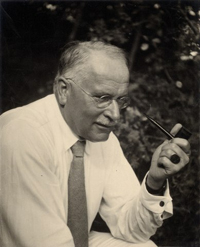Carl Jung
| Carl Gustav Jung (July 26, 1875 – June 6, 1961) was a Swiss psychiatrist and psychoanalyst who founded the discipline of analytical psychology. He was born in the Swiss canton of Thurgau and moved at age 4 with his family to Basel, where he attended the Humanistisches Gymnasium and the University of Basel, studying medicine and psychiatry. After graduating Jung worked as a research scientist at the Burghölzli Psychiatric Hospital and came to the attention of Sigmund Freud. The two men corresponded and collaborated for a time on a joint vision of human psychology. Freud saw in Jung the heir who could carry his new science of psychoanalysis and arranged his appointment as President of his International Psychoanalytical Association. Before long Jung's research and vision forced him to break with his older colleague, a separation that was painful for Jung but resulted in the establishment of analytical psychology as a coherent discipline separate from psychoanalysis. Jung's core concept was that of individuation, a lifelong process of differentiation of the self that arises from each individual’s conscious and unconscious being, a process he considered to be the main task of human life. Additional original ideas include synchronicity, the phenomena of archetypes, the collective unconscious, the psychological complex and the notions of extroversion and introversion. In addition to psychiatry and psychology, his work has influenced the fields of anthropology, archaeology, literature, philosophy, and religious studies. He was a prolific writer, and many of his works remained unpublished at the time of his death and some still await publication. |
Seven Sermons to the Dead
In late 1913, Carl Jung set out on an exploration of his psyche, a quest he called his "co..
$7.99


